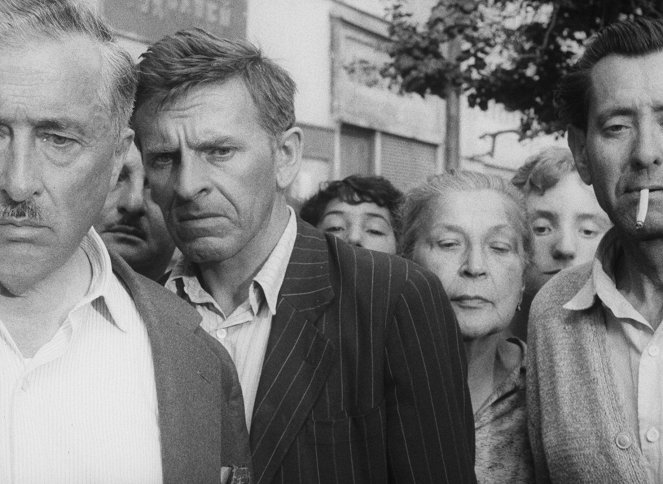Cinematography:
Vladimír NovotnýComposer:
Zdeněk LiškaCast:
Ida Kamińska, Jozef Kroner, František Zvarík, Hana Slivková, Martin Hollý st., Elena Zvaríková-Pappová, Martin Gregor, Adam Matejka, Mikuláš Ladižinský (more)Plots(1)
‘Tóno’ Brtko, a poor carpenter, is appointed by his despised Nazi brother-in-law to be 'Aryan controller' of an old Jewish widow’s sewing shop in a Nazi-occupied Slovakia in 1942. The widow, Rozalia (Yiddish theatre legend Ida Kamińska, nominated here for a Best Actress Oscar® for her performance) is near deaf, isolated and partially sighted, barely even aware of the war or able to comprehend the danger in which she lives. Believing Tóno is simply her new assistant, the two develop a friendship that sees him maintaining that fiction as he attempts to protect her from the encroaching Nazi horror. The Shop on the High Street is a complex tale of common lives disturbed and destroyed by war. Wonderfully written and performed, and with an extraordinary Zdenek Liška score, the film becomes a devastating examination of how minor compromises can finally lead to complicity in the horrors of tyranny. Winner of the Oscar® for Best Foreign Language Feature in 1965, Ján Kadár and Elmar Klos’ The Shop on the High Street (aka The Shop on Main Street) is one of the cornerstones of World Cinema, and perhaps the most internationally renowned film in all Czechoslovak cinema. (Second Run)
(more)Reviews (9)
A Czechoslovak cinematic gem that deservedly won the Oscar for Best Foreign Language Film. This superbly constructed story imbued with an atmosphere of fear and emotionally built to the max, is a chillingly accurate portrayal of the time period it is about. The film is adorned with literally fascinating performances by Jozef Kroner and Ida Kamińska. I dare say they both presented themselves here in the best roles of their lives. The last half hour blew my mind. In fact, I can't remember if I've ever had a similarly strong emotional experience with any other film.
()
A great example that Czech, Czechoslovak and Slovak cinematography definitely have something to say and draw from. A perspective on war through the eyes of ordinary people, a perspective on war through the development of one character, and a development that is brilliantly destructive. What the main pair of actors showcase is as incredible as the masterful experimentation of the directing duo. One of the peaks of Czechoslovak cinematography. Actually, of Czech and Slovak independent cinematography as well.
()
It's great to work with so many levels and ambivalence of "I'm a good person, after all, I even arise basically against my will, moreover when something comes out of it, but quietly, no one needs to know, especially when I'm calm", and the portrayal of all the characters who walk in front of, in or behind the shop. It's playful in form (hiding from the viewer/camera is exactly what one would expect Herz to have come up with) and it works in multiple ways. It can be unabashedly emotional, everyone acts with gusto, and it's the actions of the characters that are the defining factor, not the declamatory speeches that many other filmmakers would be tempted to make. It is not a probe into the soul of the Slovak nation through addressing the historical skeletons in the closet, but a probe into the soul of an ordinary man under the pressure of the times. Period. That's what makes it timeless. But the whole thing is marred by the ending, where of all the possible outcomes, the one used is by far (but far) the least interesting, and consequently the least compelling. If "it" had at least been done knowingly… Considering the way the central dilemma is handled all along, this is an undignified, cheap "how to get out of it" from Grossman.
()
If there is a reason for Kadár and Klos to be burned in hell for their film achievements of the 1950s (and there are a few reasons), then they more than make up for their sins with this film. An excellent chilling drama from the wartime era that shows how dictatorship and dark times can distort human character. By the way, when we compare the acclaimed Hřebejk's film "Divided We Fall" with "The Shop on Main Street", we will understand the difference between a very good film and an outstanding film, and the difference between playing it safe and having filmmaking courage. Overall impression: 100%. One of the best films ever produced by the Czechoslovak film school.
()
Yes, it is true that The Shop on Main Street is about, in essence, a pretty important topic in our history. In any case, it must be acknowledged that this film is from Slovakia rather than Czechoslovakia. This is not to say that it is more about Slovak history than Czech one, as it is clear to me things were exactly the same in Czechia. But the Slovaks contributed more to this film’s creation. Anyway, what didn’t sit well with me was the affected Slovak language, where I kept missing every second line and I had hard time getting into the story. Another problem, however, was the cumbersome filmmaking, where one had to pay a lot of attention in order to perceive every detail and nuance of the story.
()


Ads